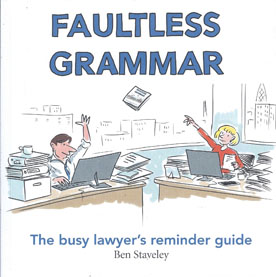
This guide tries to give you the tools to reduce to vanishing point the chances that you will write something that, because of the way it is written, will make your reader think the less of you.
Two bits of news may encourage you:-
Ben Staveley makes a serious point which aspiring lawyers would do well to heed: grammar really matters. This little book identifies the problem areas and guides you to the answers. Keep this book to hand! The Hon. Mrs Justice Whipple DBE
I thoroughly enjoyed reading Faultless Grammar. It is beautifully produced and the illustrations are terrific, making it fun to read as well as very educational. I would certainly recommend it to our students Professor Brenda Hannigan, Professor of Corporate Law and Head of Law School, University of Southampton
An appreciation by Elizabeth Robson Taylor of Richmond Green Chambers and Phillip Taylor MBE, Head of Chambers and Reviews Editor, The Barrister
How many times do you forget your grammar? It is so easy to do with our splendid English language and all its quirks and idiosyncrasies. What Ben Staveley’s short paperback Faultless Grammar gives us is the reminder guide for the busy lawyer, or for the person who’s first language is not English, or for unrepresented parties preparing their own legal submissions.
The book gives us what Staveley calls the tools to reduce to vanishing point the chances that you will write something that, because of the way it is written, will make your reader think the less of you. In fact, bite your lip, because this is just what you need when you are in a hurry and the memory might just slip a bit. And that goes for judges as well! The first rule of good advocacy, written or oral, is careful checking because there is often a slip between the pen and the lip!
A few years ago, standards of written English in the legal profession were lower than many liked, including the judiciary who were often critical of the badly presented paperwork in court. Like many advocates, we suffered from the lack of careful preparation when receiving a Brief to Counsel which was, to say the least, sub-standard.
Fortunately, standards and the quality of most lawyers’ written skills have seen a marked and noticeable improvement although it would not be a good idea to single out any particular jurisdiction for special mention because we all know where some of the big problem areas are within parts of the justice system. This book, and the splendid and humorous cartoons drawn by Patrick Blower, make our professional lives just that little bit easier with Ben’s “reminder guide”.
Two bits of quotable news from the author may encourage you further in your quest for grammatical accuracy (and superiority) in the heat of legal battle. First, this guide is based on a wide survey of the writing of lawyers entering the profession. So, it can confidently claim to cover all the most common problems. And second, the guide can be quite short. This is because, though some hapless writers ingeniously find new elephant traps to stumble into, most errors lie within a narrow set of categories. Very true.
Or, to put it another way, if you master all the things in this guide, you are likely to have all you need to move from a confident to a faultless writer. Alas, we feel this may be wish-fulfilment time but nevertheless, Ben has a point. Faultless Grammar is a fine book for all of us because we all possess one great human characteristic: our memory can fail us.
So, if you do not have the benefit of someone else’s pair of eyes to watch what you are doing with your written English, Ben’s book is a godsend if we can use such an expression today!